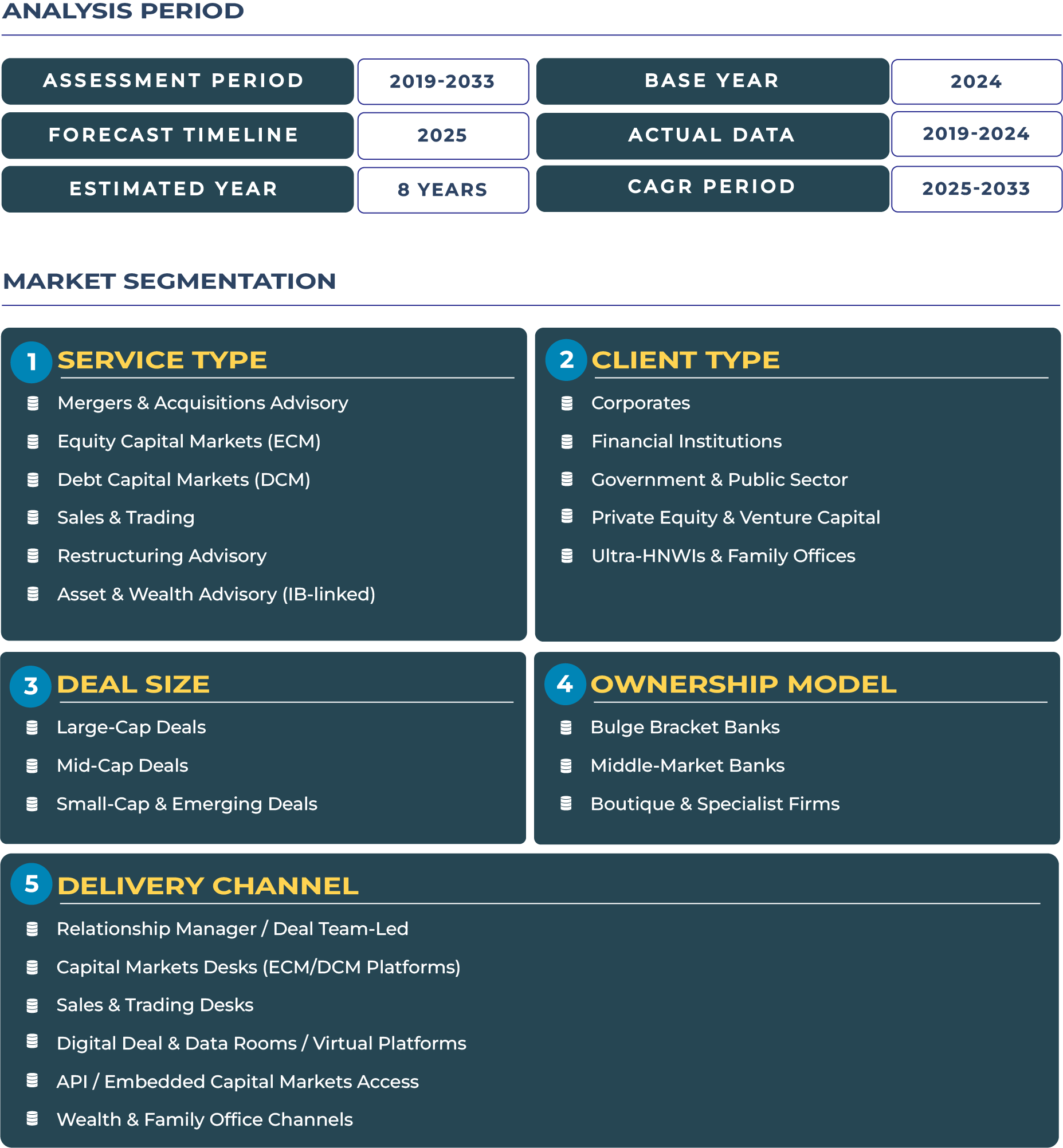Kuwait Investment Banking Market Outlook: Sovereign Wealth Momentum Meets SME Advisory Growth
Kuwait investment banking market presents a distinctive mix of deep sovereign wealth and emerging small- and medium-enterprise (SME) advisory potential. With one of the world’s largest sovereign funds, the Kuwait Investment Authority (KIA), driving substantial offshore allocations, the domestic investment banking ecosystem is evolving to capture advisory opportunities for both government-linked and private-sector entities. As of 2025, Kuwait investment banking market is valued at approximately USD 124.6 million and is projected to reach nearly USD 138.0 million by 2033, marking a modest CAGR of 1.3%. This tempered growth reflects a mature capital environment dominated by sovereign funds and a limited local deal pipeline, balanced by new openings in SME financing, infrastructure partnerships, and cross-border transactions.
Note:* The market size refers to the total revenue generated by banks through various services.
Investment banks in Kuwait are diversifying service portfolios beyond traditional debt placements and asset management, expanding toward advisory for private placements, mergers and acquisitions, and structured financing for high-growth SMEs. The ecosystem is also adapting to broader macroeconomic factors, including regional geopolitical stability, global monetary tightening, and the domestic government’s fiscal reforms. Together, these dynamics are shaping a market where sovereign wealth engagement and private-sector inclusivity define the next stage of investment banking activity in Kuwait.
How Sovereign Wealth and SME Advisory Are Reshaping Kuwait investment banking landscape
The outlook for Kuwait investment banking sector is characterized by incremental but strategic advancement. The stability of the Kuwaiti dinar, conservative fiscal policy, and continued strength of sovereign assets provide a foundation for sustainable financial activity. However, the true transformation lies in the evolution of the advisory model, from sovereign and large-cap transactions toward SME and corporate finance advisory. This shift reflects the government’s ambition, articulated through the Central Bank of Kuwait and economic diversification frameworks, to empower domestic enterprises while maintaining macroeconomic stability.
Although market expansion remains gradual, investment banks are gaining traction by facilitating corporate restructuring and private equity placements for mid-market businesses. Kuwait capital markets are also showing increased interest in equity issuance, sukuk structuring, and corporate refinancing. The government’s strategic fiscal stance has ensured liquidity stability in the financial system, creating a secure environment for investment banks to expand specialized services such as debt capital markets (DCM) structuring and project-finance advisory. The modest growth projection, therefore, is not indicative of stagnation but of consolidation and recalibration toward sustainable, SME-linked, and regionally integrated investment banking models.
Drivers & Restraints: Key Dynamics Influencing Kuwait investment banking sector
Sovereign Wealth Activity and Offshore Asset Management as Growth Catalysts
Kuwait investment banking market is inherently tied to the country’s sovereign wealth strength. The Kuwait Investment Authority (KIA), managing assets estimated at over USD 800 billion, remains a global force in capital allocation and portfolio diversification. Its active participation in infrastructure, technology, and private-equity investments across Europe and Asia indirectly drives the local banking ecosystem by setting benchmarks for asset management and advisory excellence. Investment banks in Kuwait benefit from this institutional knowledge transfer, positioning themselves to provide capital-raising and structuring services aligned with global standards. Furthermore, sustained government focus on renewable energy and regional logistics hubs is expected to generate new advisory mandates in the medium term.
Small Domestic Market and Limited Deal Flow as Structural Challenges
Despite sovereign strength, Kuwait’s domestic investment banking industry faces structural limitations. The small scale of the non-oil economy and a relatively low number of large corporate issuers restrict deal origination. Political deliberations on privatization and slow implementation of public-private partnerships (PPP) have also constrained the market’s expansion. Moreover, heightened geopolitical sensitivities in the Gulf region and cautious risk appetite among local investors temper the frequency of large-ticket transactions. These challenges necessitate a strategic pivot among investment banks, one that prioritizes regional collaboration, digital-enabled advisory models, and SME financing facilitation to expand deal flow within a limited domestic landscape.
Trends & Opportunities: Fintech Integration, Cross-Border Advisory, and SME Capitalization
Regional Fintech Adoption and Cross-Border Advisory Defining Market Modernization
Kuwait investment banking ecosystem is undergoing a gradual digital transformation. The integration of financial technology (fintech) solutions, particularly in investment analytics, risk assessment, and compliance, is enhancing operational efficiency. Cross-border advisory between Kuwait, Saudi Arabia, and the UAE is expanding as Gulf investors seek opportunities in diversified sectors such as logistics, clean energy, and healthcare. Investment banks are leveraging regional fintech partnerships to deliver faster due-diligence, digital client onboarding, and hybrid advisory models. These efforts are positioning Kuwait as a specialized, high-value advisory hub within the Gulf Cooperation Council (GCC).
SME and Infrastructure Advisory Offering Strategic Expansion Pathways
The SME segment represents one of the most promising frontiers for Kuwaiti investment banks. As the government and the Kuwait Finance and Investment Company (KFIC) promote private-sector participation and entrepreneurship, advisory services targeting business expansion, capital raising, and restructuring are witnessing increasing demand. Furthermore, the gradual revival of infrastructure investments, especially in renewable energy and urban development, provides sustained opportunities for debt structuring and PPP advisory. Investment banks that position themselves as cross-sector enablers, bridging sovereign investment expertise with SME financing, will gain a durable competitive edge in the years ahead.
Competitive Landscape: Niche Specialization and Regional Collaboration Define Kuwait Investment Banking Strategy
Kuwait investment banking landscape features a blend of domestic financial institutions and regional players seeking advisory and capital-markets mandates. Prominent local entities such as KAMCO Invest and KFIC continue to focus on asset management, equity placements, and merger and acquisition advisory. Meanwhile, regional firms with operations in Kuwait are increasingly offering cross-border structuring and syndication services. Strategic focus areas include SME-linked financing and restructuring advisory that enable deal-flow sustainability within a limited domestic market. In 2024–2025, KAMCO Invest expanded its portfolio in debt market advisory, aligning with growing corporate refinancing activity, a signal of the market’s gradual but steady modernization. The overall competitive trend points toward niche specialization, stronger GCC collaboration, and an emphasis on tailored advisory solutions for diversified clientele.







